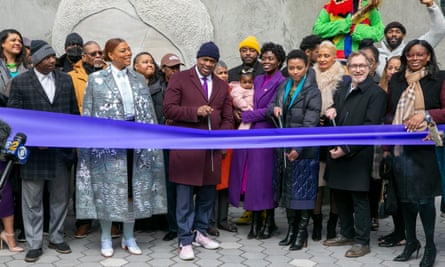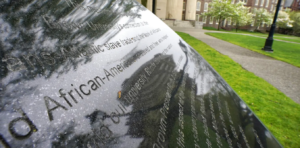Queen Latifah and Pia Wilson take part in celebration of abolitionist in New Jersey city
Architect Nina Cooke John stands with the Harriet Tubman monument she designed titled Shadow of a Face’, in Newark, New Jersey, on Thursday. Photograph: Ted Shaffrey/AP
Newark’s Mayor Ras Baraka, community leaders and celebrities including the musician and actor Queen Latifah and writer Pia Wilson led celebrations of a new monument to the abolitionist Harriet Tubman this week. The ceremony was a historic final step in replacing a Christopher Columbus statue that was removed from a square in the New Jersey city following the murder of George Floyd in 2020.
Gone is an ode to Columbus, who engaged in the kidnapping, enslavement and killing of Indigenous people in the Caribbean. Instead is now a depiction of Tubman, a legendary racial justice activist. Known as the “Moses of her people”, Tubman, who escaped slavery herself, helped other enslaved people gain their freedom amid great danger, acting as what was known as a conductor of the Underground Railroad during the civil war.
The new Tubman monument in Newark, Shadow of a Face, designed by the architect Nina Cooke John, is installed at a park that had been known as Washington Park since the 1790s.
Last year, the park was renamed Harriet Tubman Square, a move that local preservationists questioned given Tubman’s loose connection to Newark compared with George Washington’s during the revolutionary war. Tubman reportedly passed runaway enslaved people through the Presbyterian church in Newark as part of the Underground Railroad, the huge network of safe houses and contacts by which people risked their lives to escape or help others flee slave-holding parts of the US.
The monument features a circular wall with a steel outline of Tubman within and ceramic tiles from Newark residents. It also includes a “listening wall” where visitors can hear accounts, narrated by the Newark-born rapper and actor Queen Latifah and written by author Pia Wilson, about Tubman’s life and the city’s connection to emancipation. Cooke John told NJ.com that the installation “aims to connect the stories of the past to the stories of today”.
Me and Queen Latifah in Newark’s Harriet Tubman Square! I am so proud and honored to have written the audio component of the new Harriet Tubman monument, “Shadow of a Face, which Queen Latifah narrated. The monument was designed by architect & artist Nina Cooke John. pic.twitter.com/3wdG62dSpL— Pia Wilson (@pwilson720) March 9, 2023
Tubman’s presence paid homage to the history of Newark as a hub for activism among abolitionists in pursuit of emancipation during the civil war. The since-demolished Presbyterian Plane Street Colored church was built in Newark in 1836 on what is now Frederick Douglass Field at Rutgers University.
Home to a school and gathering space, the church “represented the unyielding work of the Newark Black activist community for Black emancipation and as Underground Railroad activists”, according to the National Park Service.

“To have something that started as a response to George Floyd and his murder … people all around the country pulling down statues that represented a history that was oppressive, we wanted to take it a step further,” Baraka said on Thursday. “We wanted to build something. And as a result of that, this is what we got.”
“In the spirit of Harriet Tubman,” Michele Jones Galvin, Tubman’s great-great-great-grandniece, said at the event, “the monument … will memorialize her heroism, will inspire future generations to take action when they see injustice and will instill the value of service to the most vulnerable in our society.”
I hope you appreciated this article. Before you move on, I was hoping you would consider taking the step of supporting the Guardian’s journalism.
From Elon Musk to Rupert Murdoch, a small number of billionaire owners have a powerful hold on so much of the information that reaches the public about what’s happening in the world. The Guardian is different. We have no billionaire owner or shareholders to consider. Our journalism is produced to serve the public interest – not profit motives.
And we avoid the trap that befalls much US media – the tendency, born of a desire to please all sides, to engage in false equivalence in the name of neutrality. While fairness guides everything we do, we know there is a right and a wrong position in the fight against racism and for reproductive justice. When we report on issues like the climate crisis, we’re not afraid to name who is responsible. And as a global news organization, we’re able to provide a fresh, outsider perspective on US politics – one so often missing from the insular American media bubble.
Around the world, readers can access the Guardian’s paywall-free journalism because of our unique reader-supported model. That’s because of people like you. Our readers keep us independent, beholden to no outside influence and accessible to everyone – whether they can afford to pay for news, or not.
If you can, please consider supporting the Guardian today. Thank you.
Betsy Reed
Editor, Guardian US




